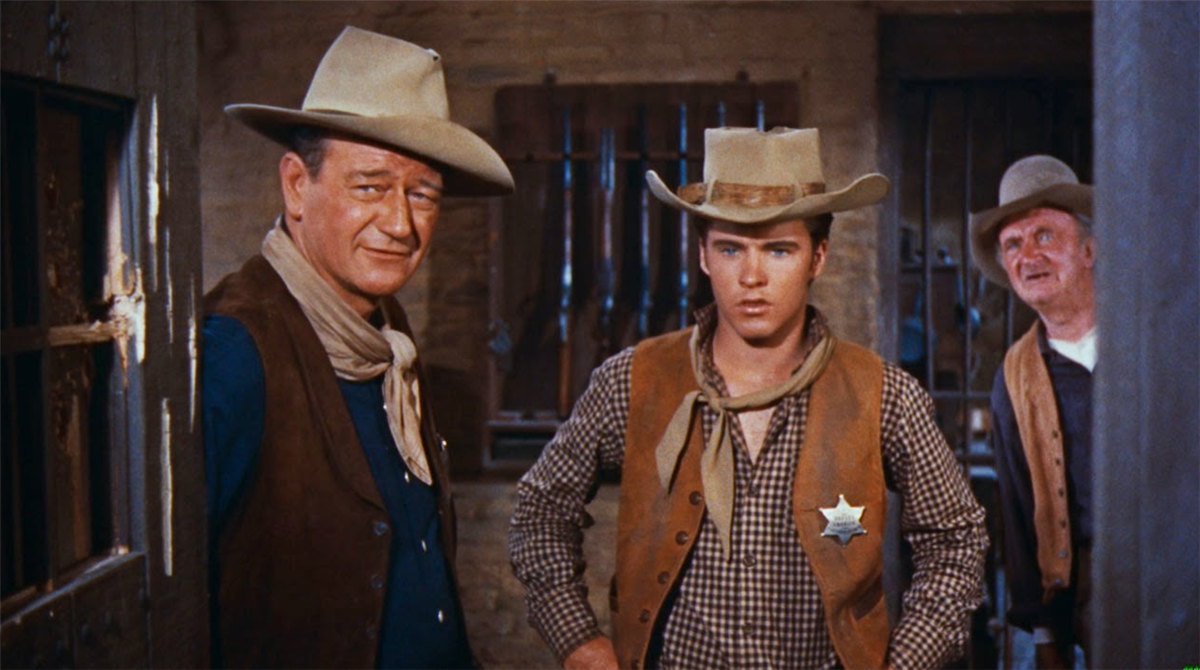Howard Hawks’ Rio Bravo(1959), starring John Wayne, Dean Martin and Angie Dickinson is one of the best and most entertaining Westerns ever made. It’s also the definitive John Wayne Picture, that shows all the facets of Wayne’s screen persona to the fullest.
“I have a strong affection for the singing sequence in Howard Hawks’ Rio Bravo… It’s probably one of the best examples of Hawksian male camaraderie… When they show Rio Bravo in cinemas, at revival houses, everyone laughs at that scene, because it seems funny nowadays in the movies: people don’t burst into song unless it’s a musical. Clint Eastwood doesn’t suddenly start singing in Unforgiven. And there’s no soundtrack music kicking in here; they’re just playing the guitar. But that’s one of the things I love about it too: it’s realistic, but it also calls back a different time period in movies when you could do stuff like that and not think about it twice. When I watch it on video I find that scene moving and very, very charming; I don’t laugh at it at all.”
Quentin Tarantino
How many women ever had a John ‘Duke’ Wayne character named after them?
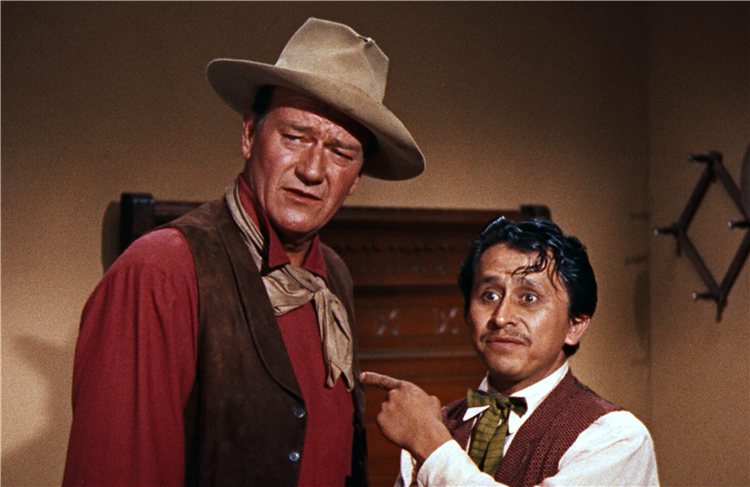
Just one: Chance de Widstedt, who was Director Howard Hawks’ girlfriend at the time he made “Rio Bravo.” Hawks named John Wayne’s character after her as John T. Chance. So one can imagine how personal the film was for Hawks. Before he named him John T. Chance, the name of the character of the Sheriff of Rio Bravo was John Wayne. So you can imagine how much the character was tailor made for Duke. Rio Bravo is one of those rare films which reflects a very strong personal point of view of the director; which also is a definitive star vehicle for its lead star\actor; and also an exquisitely crafted crowd pleasing entertainer. Hawks was one of the most versatile gentlemen and one of the most versatile directors in Hollywood. In real life, he was a daredevil flier, an automobile racing driver, a big-game fisherman, a champion golfer, a successful writer of adventure stories and a big shot Hollywood director. As a director ,he made films in every genre imaginable. But today, the perception is that he was a director of Westerns, which is surprising, because only 5 of the 40 odd movies he made has been Westerns. The perception is mainly due to the fact that 3 of his last 6 movies were Westerns, and a fourth – Hatari with Wayne – was kind of a modern Western set in Africa. When Hawks started work on Rio Bravo, he had just returned from a long sabbatical from Europe. He hadn’t made a film in 4 years and his last successful picture was almost a decade ago. So when he came back, he was most intrigued by the success of Westerns on Television; there was a very successful Western show every night. What he understood from this is that the audience would keep returning to watch a show, not for its story or plot, but for the characters; because each episode was like a new story, and only the characters\actors remain the same. This inspired him to make a Western as his comeback vehicle in Hollywood. It was going to be purely character driven, concentrating more on the actions and interactions between the characters, rather than a well rounded plot. Hawks was sure that if he could get the audience invested in the actors and their characters, he could take them anywhere he wanted, And to this end, he tailored a script to match the biggest Western star of the time, John Wayne. Hawks and Duke had earlier worked together, most successfully, in Red River(1948), and Duke was interested in working with Hawks again.

John Wayne is, of course, the greatest American movie star of all times. He is also the most prolific, having done close to 200 films over a span of 50 years, most of them Westerns. So what made John Wayne the ultimate movie star and icon?. Well, a combination of a lot of things, both on screen and off screen. But if we just stick to ‘On screen’, then Rio Bravo has all the answers to that question. Rio Bravo is not the greatest film Duke made; That could be The Searchers or Red River or The Quiet man, But Rio Bravo is the greatest ‘John Wayne Western’ ever. It showcased all sides of the John Wayne persona to the fullest. In both The Searchers and Red River, his heroism was dark and obsessive, in The Quiet man , it was vulnerable and romantic, In True Grit , it was funny and caricaturish, but no role combines all these aspects in one whole as in Rio Bravo. The main aspect of the John Wayne persona is that of the leader and a father figure of a community. He personifies the American virtues of individualism. He is also a man who is on a mission, either alone or leading a group of men. He is always the senior, the wiser and the most courageous. We have seen this right from his career making role of Ringo Kidd in his mentor John Ford’s 1939 film Stagecoach. But it was with Howard Hawks’ Red River that this image was fully formed. It was the first film that Wayne and Hawks made together, and it enabled Duke, who was into his forties, to move into more senior\mature roles. Post Red River, he started tackling more complex roles, in which he is always seen to be protecting\ leading\ mentoring a younger novice with whom he may be at loggerheads. In Red River, it was Montgomery Clift; in The Searchers it was Jeffrey Hunter; in The Man who shot Liberty Valance it was James Stewart etc. etc. Rio Bravo deals with pretty similar subjects as Red River, that of fathers and sons and tough guys bonding together in crisis, which is a pet theme of Hawks. A big exception being that this a very cheerful and optimistic take on these subjects, with the Father son conflicts working as a subtext, as opposed to the more darker tone of Red River. The film was basically an antidote to the more psychological westerns that was prevalent in the 50’s, especially the Gary Cooper starrer “High Noon”, which both Hawks and Wayne hated. Hawks’ disapproval was strictly personal, and not political like Wayne. He felt that Cooper plays a sheriff who runs around like a chicken with his head cut off, trying to get everybody to help him and finally his Quaker wife saves him. That isn’t a sheriff. If a sheriff is any good and somebody comes and asks him if they can help him, he says, “How good are you? Can you go up against the best man they’ve got?” And if you said, “No,” he’d say, “Stay out of it, I’d just have to carry you.” So he created exactly that kind of Sheriff for Duke.
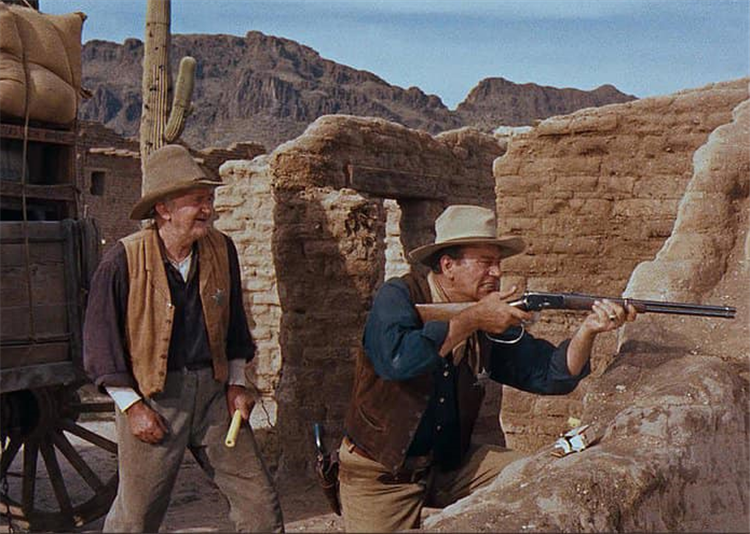
Chance is the sheriff of Rio Bravo town in Texas, he is the ‘Father’ figure of the story. His game-legged deputy, Stumpy(Walter Brennan), is the ‘Mother’ figure, and another deputy Dude(Dean Martin) is the wayward ‘Son’. Dude, like a bad son, had disobeyed the father when, against his father’s wishes, he ran off with a (no good) women who came to town on stagecoach. Later, he returned heartbroken and a drunkard. So, now, Chance has to babysit him until he is back on his feet and is a man again. At the point when the film begins , Dude is trying hard to go straight and get rid of his addiction. The main conflict is between the overprotective, but tough as nails father figure. trying to help him get back on his feet, and the self loathing ‘son’ trying to do it all by himself without anybody’s help. Stumpy is caught in the middle, and trying hard to keep the peace between the two. He is also at loggerheads with Chance at his treatment of Dude. As opposed to other films, where Wayne or Wayne & Company sets out on a mission, here, they are ‘staying put’ inside the town. Their mission is to hold dreaded criminal, Joe Burdette, in prison. Joe is the brother of ultra-rich Rancher Nathan Burdette, who owns pretty much everything and everybody in and out of the town. Joe murdered an unarmed man in the opening scenes of the film and Chance is now holding him a prisoner so that he can hand him over to a Federal Marshall. It will be take some days for the Marshall to get here, so till then Chance, Stumpy and Dude should unite against the efforts of Burdette and his men to extricate Joe. That’s the whole plot of the film; but that’s not the film’s focus. There are at least four subplots running in parallel throughout the film, and in each one of them Chance is playing the role of a redeemer or a sort of social reformer. First is the redemption story of Dude. Then of course Chance is hell-bent on ridding the town of the Burdette menace. The third has to do with his old friend Pat Wheeler who rides into town with his young gunslinger Colorado Ryan. Chance knew Ryan’s father well. Ryan is young and smart and quick on the draw. he is, in some ways, an image of the young Dude before he ruined his life. Wheeler wants Chance to take Ryan under his wings, as he will be a great help for him in this crisis, but Chance refuses. Soon enough, wheeler is killed by Burdette’s men. Chance gives Dude the opportunity to take down Wheeler’s killer. Dude rises to the occasion and gets the man who killed Wheeler, earning some grudging praise from Chance, but like a tough father, he also deconstructs logically how and why Dude succeeded, as Chance succinctly puts it: “They were laughing at you, but This time you surprised them, next time , they’ll shoot first and laugh after
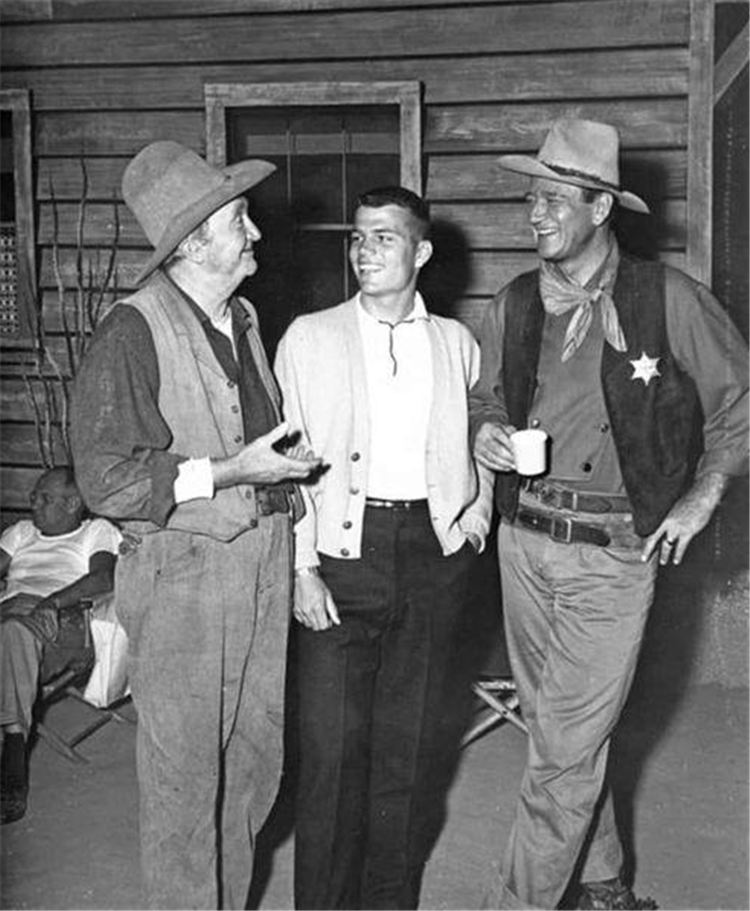
Duke makes for a charming romantic hero in his pairing with Angie Dickinson. Dickinson plays Feathers, a women of ill-repute, who is wandering the west after she lost her husband to gambling and liquor. She comes to town on the stagecoach and immediately starts warming up to Sheriff Chance. This forms the fourth subplot in the film. Chance is wary of her (as he is fully aware what happened to Dude when he got mixed up with a woman like that) and tries his best to send her off from town. but bit by bit, he starts warming up to her, while she pursues him rather aggressively. Chance’s courtship of her is tough(In typical Wayne fashion) and he never vocally admits to being in love with her. Though by the end of the film, she (and the viewers) are more than convinced that he is deeply in love with her. Their relationship subtext goes more like: now that both his deputies (children) are grown up and on their own feet, the Sheriff(Father) can get a girl for himself. This comes after Chance & Co. trounces Burdette and his men in the explosive filled climax; Burdette and his men are locked up in jail in the end. The new guy Ryan agrees to watch over them; which means that Stumpy is also free from his motherly (jail)house keeping duties. The scenes between Duke and Dickinson brings out the best in Duke, particularly the vulnerable side. So does his scenes with Dean Martin. On the other hand, the constant banter between him and Stumpy showcases his funny side to the hilt.

This piece will not be complete without a few words about the dialogues in the film. The writers Leigh Brackett and Jules Furthman, under the supervision of Hawks, has fashioned an endlessly quotable script. Hawks’ films are filled with scenes of crackling conversations between characters that brings out their specific character traits. As opposed to the theory that an image speaks a thousand words, Hawks’ images actually consists of a thousand words. Not that he is not a visual director, as seen in Red River and Land of pharaohs , he is capable of handling complex visual sequences. The opening of Rio Bravo itself is a wordless 5 minute sequence, which plays out like a silent movie and establishes all the main themes of the film. It’s just that Hawks relies primarily on dialogue to convey both plot and character as opposed to someone like John Ford or Hitchcock who makes pure visual cinema. No wonder, someone like Tarantino is such a big fan of Hawks and particularly this movie. But unlike Tarantino’s stylized dialogue, Hawks’ words are more earthy and real, though no less enjoyable. Take the scene in the Jailhouse when Nathan Burdette comes to visit his brother. The Four way conversation between Chance, Nathan, Joe and Stumpy reveals a lot about the plot and their characters. For one, Chance fully knows that his mission is suicidal; that he and the others may not come out of it alive, but he made sure that neither would Joe. We get to know about an old grudge between Burdette and Stumpy over some land, and that Stumpy isn’t just the simple idiot we take him for . We get to know the background of the Burdettes, how influential they are and what a dreaded criminal Joe is etc. etc. Or take the scene where Wayne is describing Dude’s backstory to Wheeler, The words, and Wayne’s delivery of it, is so cool and visual that you feel like you are watching those scenes of Dude going off with that girl on the stagecoach.
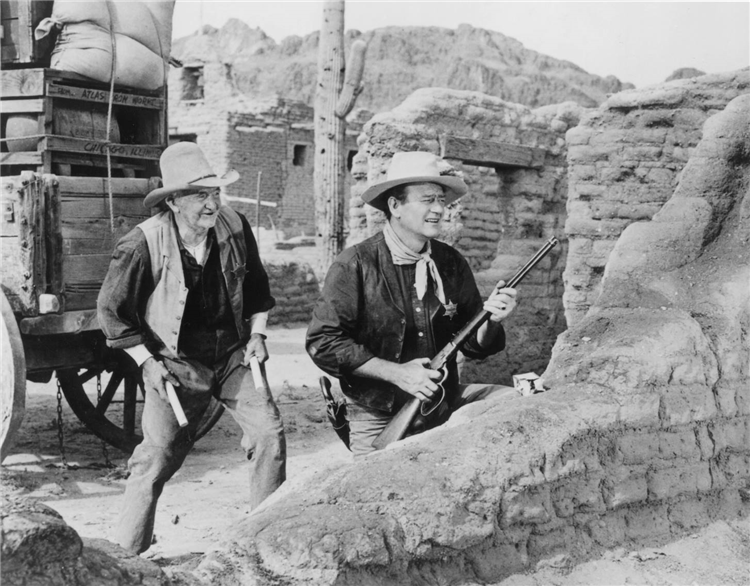
On its release, Rio Bravo became a much needed hit for both Wayne and Hawks. Like Hawks, Wayne was also facing a career slump; he hadn’t had a hit since The Searchers released in 1956, and had four flops in a row; very unusual and damaging for a huge star like him. It was being said around town that Wayne’s days as a star was coming to an end. Rio Bravo turned out to be a huge reprieve for the star. After this, he worked with Hawks 3 more times, and he never asked him for a script again, only the start date. Reportedly, Hawks was so nervous at the beginning of this film that he puked his guts out before the first shot, but then he pulled himself together and went out and made a classic. Hawks loved this film so much that he remade it twice as El Dorado and Rio Lobo with minor alterations in the plot and major changes in the cast- except for John Wayne. As John Travolta’s Chili Palmer says in Get Shorty: “Dean Martin played the drunk in Rio Bravo and Robert Mitchum played the drunk in El Dorado,. Basically, it was the same part. Now John Wayne, he did the same in both. He played John Wayne”. Indeed, nobody can play John Wayne like John Wayne.
